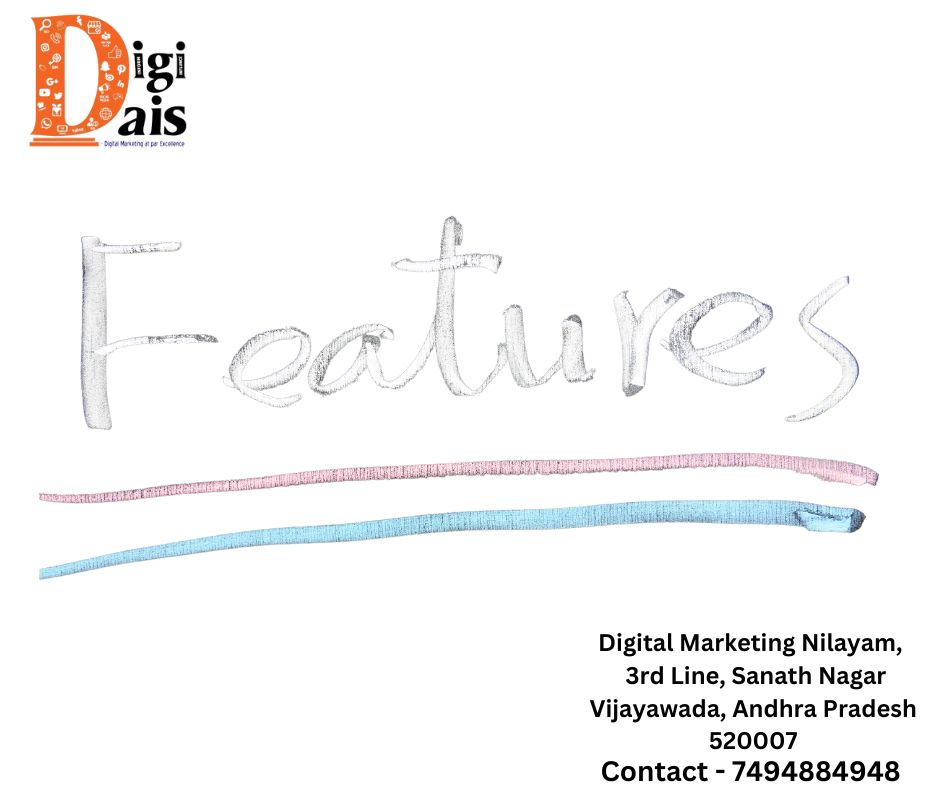Digital marketing is a multifaceted strategy that leverages online channels and technologies to promote products or services. Here are key features that make digital marketing a powerful tool in today’s business landscape:
-
Global Reach: Digital marketing enables businesses to reach a global audience, breaking down geographical barriers and expanding market reach.
-
Targeted Advertising: Precise targeting options allow marketers to reach specific demographics, interests, and behaviors, ensuring messages are delivered to the most relevant audience.
-
Cost-Effectiveness: Digital marketing often offers a more cost-effective alternative to traditional advertising, allowing businesses with varying budgets to engage in effective promotional activities.
-
Measurable Analytics: Robust analytics tools provide real-time data on campaign performance, allowing marketers to analyze metrics such as website traffic, conversion rates, and engagement.
-
Interactivity and Engagement: Digital platforms facilitate two-way communication, enabling businesses to engage with their audience through comments, shares, and direct messages.
-
Content Variety: A wide range of content formats, including text, images, videos, and interactive elements, allows marketers to create diverse and engaging campaigns.
-
SEO Optimization: Digital marketing strategies incorporate search engine optimization (SEO) techniques to improve a brand’s visibility in search engine results, driving organic traffic.
-
Social Media Integration: Leveraging social media platforms enables businesses to build a brand presence, engage with their audience, and capitalize on viral marketing opportunities.
-
Personalization: Digital marketing allows for personalized communication, tailoring messages based on user behavior, preferences, and interactions.
-
Mobile Optimization: With the increasing use of mobile devices, digital marketing campaigns are optimized for mobile platforms to ensure a seamless user experience.
-
Real-Time Campaign Adjustments: Flexibility in real-time adjustments allows marketers to modify campaigns based on performance, trends, or changing business goals.
-
Easier A/B Testing: Marketers can conduct A/B testing more efficiently, experimenting with different elements of campaigns to identify the most effective strategies.
-
Data Security and Privacy Compliance: Adherence to data security regulations and privacy standards ensures that consumer information is handled responsibly and ethically.
-
Email Marketing Automation: Automated email campaigns streamline communication processes, nurturing leads, and maintaining customer engagement.
-
Customer Feedback and Reviews: Digital platforms facilitate the collection of customer feedback and reviews, contributing to brand reputation and trust-building.
-
E-commerce Integration: Seamless integration with e-commerce platforms enables businesses to drive sales directly through digital channels.
-
Constant Innovation: The digital marketing landscape is dynamic, with continuous innovations and emerging technologies that marketers can leverage for competitive advantage.
-
Social Proof and Influencer Marketing: Utilizing social proof and collaborating with influencers help build credibility and trust among the target audience.
-
Multichannel Marketing: Businesses can implement a multichannel approach, utilizing various online channels to ensure a comprehensive and cohesive marketing strategy.
-
Customer Retargeting: Digital marketing allows for the implementation of retargeting strategies, re-engaging users who have previously interacted with the brand online.
Incorporating these features into a digital marketing strategy empowers businesses to navigate the online landscape effectively, connect with their audience, and achieve their marketing objectives.
